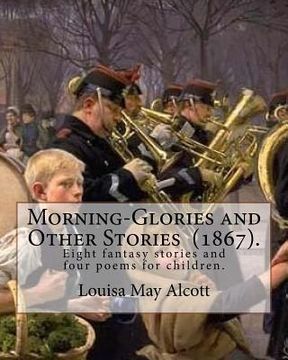Morning-Glories and Other Stories (1867). By: Louisa May Alcott: Eight fantasy stories and four poems for children. (en Inglés)
Reseña del libro "Morning-Glories and Other Stories (1867). By: Louisa May Alcott: Eight fantasy stories and four poems for children. (en Inglés)"
Louisa May Alcott ( November 29, 1832 - March 6, 1888) was an American novelist and poet best known as the author of the novel Little Women (1868) and its sequels Little Men (1871) and Jo's Boys (1886). Raised by her transcendentalist parents, Abigail May and Amos Bronson Alcott in New England, she also grew up among many of the well-known intellectuals of the day such as Ralph Waldo Emerson, Nathaniel Hawthorne, Henry David Thoreau and Henry Wadsworth Longfellow.Alcott's family suffered financial difficulties, and while she worked to help support the family from an early age, she also sought an outlet in writing. She began to receive critical success for her writing in the 1860s. Early in her career, she sometimes used the pen name A. M. Barnard, under which she wrote novels for young adults that focused on spies, revenge, and cross dressers.Published in 1868, Little Women is set in the Alcott family home, Orchard House, in Concord, Massachusetts and is loosely based on Alcott's childhood experiences with her three sisters. The novel was very well received and is still a popular children's novel today, filmed several times.Alcott was an abolitionist and a feminist and remained unmarried throughout her life. She died from a stroke, two days after her father died, in Boston on March 6, 1888. Early life: Louisa May Alcott was born on November 29, 1832, in Germantown, which is now part of Philadelphia, Pennsylvania, on her father's 33rd birthday. She was the daughter of transcendentalist and educator Amos Bronson Alcott and social worker Abby May and the second of four daughters: Anna Bronson Alcott was the eldest; Elizabeth Sewall Alcott and Abigail May Alcott were the two youngest. The family moved to Boston in 1834, where Alcott's father established an experimental school and joined the Transcendental Club with Ralph Waldo Emerson and Henry David Thoreau. Bronson Alcott's opinions on education and tough views on child-rearing shaped young Alcott's mind with a desire to achieve perfection, a goal of the transcendentalists. His attitudes towards Alcott's wild and independent behavior, and his inability to provide for his family, created conflict between Bronson Alcott and his wife and daughters. In 1840, after several setbacks with the school, the Alcott family moved to a cottage on 2 acres (8,100 m2) of land, situated along the Sudbury River in Concord, Massachusetts. The three years they spent at the rented Hosmer Cottage were described as idyllic. By 1843, the Alcott family moved, along with six other members of the Consociate Family, to the Utopian Fruitlands community for a brief interval in 1843-1844. After the collapse of the Utopian Fruitlands, they moved on to rented rooms and finally, with Abigail May Alcott's inheritance and financial help from Emerson, they purchased a homestead in Concord. They moved into the home they named "Hillside" on April 1, 1845, but moved in 1852, selling to Nathaniel Hawthorne who renamed it The Wayside. Moving 22 times in 30 years, the Alcotts returned to Concord once again in 1857 and moved into Orchard House, a two-story clapboard farmhouse, in the spring of 1858. Alcott's early education included lessons and from the naturalist Henry David Thoreau where she was inspired to writeThoreau's Flute based on her time at Walden's Pond. Most of the education she received thought came from her father, who was strict and believed in "the sweetness of self-denial". She also received some instruction from writers and educators such as Ralph Waldo Emerson, Nathaniel Hawthorne, and Margaret Fuller, and Julia Ward Howe, all of whom were family friends. She later described these early years in a newspaper sketch entitled "Transcendental Wild Oats". The sketch was reprinted in the volume Silver Pitchers (1876), which relates the family's experiment in "plain living and high thinking" at Fruitlands.....

